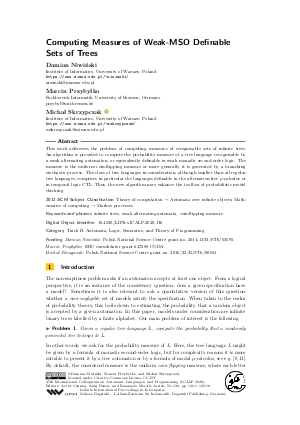Computing Measures of Weak-MSO Definable Sets of Trees
Authors
Damian Niwiński,
Marcin Przybyłko,
Michał Skrzypczak 
-
Part of:
Volume:
47th International Colloquium on Automata, Languages, and Programming (ICALP 2020)
Part of: Series: Leibniz International Proceedings in Informatics (LIPIcs)
Part of: Conference: International Colloquium on Automata, Languages, and Programming (ICALP) - License:
 Creative Commons Attribution 3.0 Unported license
Creative Commons Attribution 3.0 Unported license
- Publication Date: 2020-06-29
File

PDF
LIPIcs.ICALP.2020.136.pdf
- Filesize: 0.54 MB
- 18 pages
Document Identifiers
Subject Classification
ACM Subject Classification
- Theory of computation → Automata over infinite objects
- Mathematics of computing → Markov processes
Keywords
- infinite trees
- weak alternating automata
- coin-flipping measure
Metrics
- Access Statistics
-
Total Accesses (updated on a weekly basis)
0Document
0Metadata
Abstract
This work addresses the problem of computing measures of recognisable sets of infinite trees. An algorithm is provided to compute the probability measure of a tree language recognisable by a weak alternating automaton, or equivalently definable in weak monadic second-order logic. The measure is the uniform coin-flipping measure or more generally it is generated by a branching stochastic process. The class of tree languages in consideration, although smaller than all regular tree languages, comprises in particular the languages definable in the alternation-free μ-calculus or in temporal logic CTL. Thus, the new algorithm may enhance the toolbox of probabilistic model checking.
Cite As Get BibTex
Damian Niwiński, Marcin Przybyłko, and Michał Skrzypczak. Computing Measures of Weak-MSO Definable Sets of Trees. In 47th International Colloquium on Automata, Languages, and Programming (ICALP 2020). Leibniz International Proceedings in Informatics (LIPIcs), Volume 168, pp. 136:1-136:18, Schloss Dagstuhl – Leibniz-Zentrum für Informatik (2020)
https://doi.org/10.4230/LIPIcs.ICALP.2020.136
BibTex
@InProceedings{niwinski_et_al:LIPIcs.ICALP.2020.136,
author = {Niwi\'{n}ski, Damian and Przyby{\l}ko, Marcin and Skrzypczak, Micha{\l}},
title = {{Computing Measures of Weak-MSO Definable Sets of Trees}},
booktitle = {47th International Colloquium on Automata, Languages, and Programming (ICALP 2020)},
pages = {136:1--136:18},
series = {Leibniz International Proceedings in Informatics (LIPIcs)},
ISBN = {978-3-95977-138-2},
ISSN = {1868-8969},
year = {2020},
volume = {168},
editor = {Czumaj, Artur and Dawar, Anuj and Merelli, Emanuela},
publisher = {Schloss Dagstuhl -- Leibniz-Zentrum f{\"u}r Informatik},
address = {Dagstuhl, Germany},
URL = {https://drops.dagstuhl.de/entities/document/10.4230/LIPIcs.ICALP.2020.136},
URN = {urn:nbn:de:0030-drops-125430},
doi = {10.4230/LIPIcs.ICALP.2020.136},
annote = {Keywords: infinite trees, weak alternating automata, coin-flipping measure}
}
Author Details
Funding
- Niwiński, Damian: Polish National Science Centre grant no. 2014-13 ST6/03595.
- Przybyłko, Marcin: ERC consolidator grant 647289 CODA.
- Skrzypczak, Michał: Polish National Science Centre grant no. 2016/22/E/ST6/00041.
References
-
André Arnold and Damian Niwiński. Fixed point characterisation of weak monadic logic definable sets of trees. In Tree Automata and Languages, pages 159-188, 1992.

-
Saugata Basu, Richard Pollack, and Marie-Françoise Roy. Algorithms in Real Algebraic Geometry, volume 10 of Algorithms and Computation in Mathematics. Springer-Verlag Berlin Heidelberg, 2006.

-
Michael Ben-Or, Dexter Kozen, and John Reif. The complexity of elementary algebra and geometry. Journal of Computer and System Sciences, 32(2):251-264, 1986.

-
Jacek Bochnak, Michel Coste, and Marie-Françoise Roy. Real Algebraic Geometry, volume 36 of A Series of Modern Surveys in Mathematics. Springer-Verlag Berlin Heidelberg, 1998.

-
Krishnendu Chatterjee, Marcin Jurdzinski, and Thomas A. Henzinger. Quantitative stochastic parity games. In SODA, pages 121-130, 2004.

-
Taolue Chen, Klaus Dräger, and Stefan Kiefer. Model checking stochastic branching processes. In MFCS, pages 271-282, 2012.

-
George E. Collins. Hauptvortrag: Quantifier elimination for real closed fields by cylindrical algebraic decomposition. In Automata Theory and Formal Languages, pages 134-183, 1975.

-
Costas Courcoubetis and Mihalis Yannakakis. The complexity of probabilistic verification. J. ACM, 42(4):857-907, 1995.

-
Stéphane Demri, Valentin Goranko, and Martin Lange. Temporal Logics in Computer Science: Finite-State Systems. Cambridge Tracts in Theoretical Computer Science. Cambridge University Press, 2016.

-
Alessandro Facchini, Filip Murlak, and Michał Skrzypczak. Rabin-Mostowski index problem: A step beyond deterministic automata. In LICS, pages 499-508, 2013.

-
Gaëlle Fontaine. Continuous fragment of the mu-calculus. In CSL, pages 139-153, 2008.

-
Tomasz Gogacz, Henryk Michalewski, Matteo Mio, and Michał Skrzypczak. Measure properties of regular sets of trees. Information and Computation, 256:108-130, 2017.

-
Erich Grädel, Wolfgang Thomas, and Thomas Wilke, editors. Automata, Logics, and Infinite Games: A Guide to Current Research, volume 2500 of Lecture Notes in Computer Science. Springer, 2002.

-
Claire Jones and Gordon D. Plotkin. A probabilistic powerdomain of evaluations. In LICS, pages 186-195, 1989.

-
Henryk Michalewski and Matteo Mio. On the problem of computing the probability of regular sets of trees. In FSTTCS, pages 489-502, 2015.

-
Matteo Mio. On the equivalence of game and denotational semantics for the probabilistic mu-calculus. Logical Methods in Computer Science, 8(2), 2012.

-
David E. Muller, Ahmed Saoudi, and Paul E. Schupp. Alternating automata. the weak monadic theory of the tree, and its complexity. In ICALP, volume 226 of Lecture Notes in Computer Science, pages 275-283, 1986.

-
Damian Niwiński and Igor Walukiewicz. A gap property of deterministic tree languages. Theoretical Computer Science, 1(303):215-231, 2003.

-
Dominique Perrin and Jean-Éric Pin. Infinite Words: Automata, Semigroups, Logic and Games. Elsevier, 2004.

-
Marcin Przybyłko. On computing the measures of first-order definable sets of trees. In GandALF, pages 206-219, 2018.

- Marcin Przybyłko and Michał Skrzypczak. The uniform measure of simple regular sets of infinite trees. CoRR, abs/2001.11576, 2020. URL: http://arxiv.org/abs/2001.11576.
-
Nasser Saheb-Djahromi. Cpo’s of measures for nondeterminism. Theor. Comput. Sci., 12:19-37, 1980.

-
Jerzy Skurczyński. The Borel hierarchy is infinite in the class of regular sets of trees. Theoretical Computer Science, 112(2):413-418, 1993.

-
Ludwig Staiger. The Hausdorff measure of regular omega-languages is computable. Bulletin of the EATCS, 66:178-182, 1998.

-
Alfred Tarski. A Decision Method for Elementary Algebra and Geometry. University of California Press, 1951.

